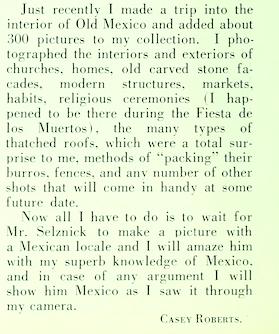I'm drunk with love, my body aches... 2024 Website's 20th Year Online! | ||
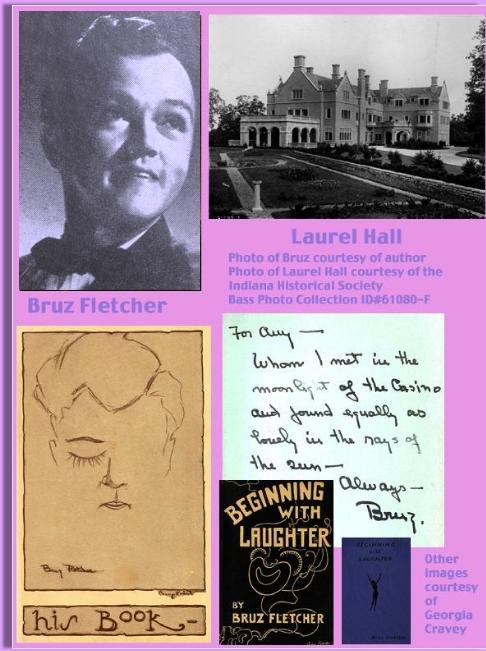 | ||||||||||||||
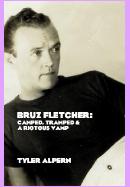 | ||||||||||||||
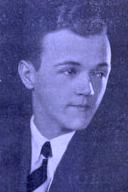 | ||||||||||||||
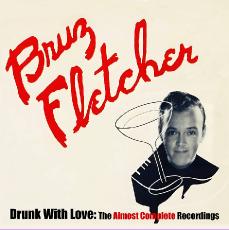 | ||||||||||||||
BRUZ FLETCHER Remembering a Pioneering Gay Voice
Multi talented writer, photograher, composer, performer Bruz Fletcher, born to one of the wealthiest and most dysfunctional families in Indiana, twice took the difficult journey of riches to rags in his short, turbulent 34 years. His dramatic life was an ever changing saga, a wild and sad story of extremes and incredible plot twists. He ran away from home at age 8 and shot himself attempting suicide as young teen. Soon after, while home from boarding school for the holidays, his mother and grandmother drank poison committing a double suicide. His older sister Louisa's many escapades frequently made national news. She escaped their family’s high society life and lived as a man, joined a Broadway show, then took off for Europe where she was jilted by a German count on the eve of their wedding. Later she was sent to an asylum and upon release was arrested for physically attacking Lady Bathurst who turned out to be an imposter herself, all before dying at age 24. "From frocks to overalls, from society to Bohemia, from the Wabash to the Rhine, skips lovely, lawless Louisa," exclaimed one headline. Bruz's ambitious father lost the grand fortune, sprawling manor and prestigious banking buisness the family built over generations and eventually found work as an elevator operator. Bruz later lost his own home and possesions in a fire.
Casitng aside his private tragedies in public Fletcher sparkled as he entertained and schmoozed nightly in glamorous nightclubs, delighting his often well-known patrons with his electric, quick witted, sophisticated and risqué songs. His record 5 year run at L.A.'s Club Bali created a bawdy, partylike atmosphere in what was a wild oasis for the city's most outrageous celebrities and notables.
An out and bold pioneer, Fletcher and his partner Casey Roberts lived together openly in home after home, in state after state, hosting salons and publicly collaborated on numerous artistic endeavors ranging from the theatrical, to literary, to the decorative and fine arts. The two kept no secrets about living together over the years. Their domestic arrangements were written often about in newspapers and magazines as were their many artistic collaborations. Few such open, prominent and well documented gay couples existed in that era.
In 1941, baby-faced Fletcher asphyxiated himself in a running car in friend's garage, leaving behind three albums of wonderful songs, a handful of theatrical works, two novels and a short story all of which are peppered with autobiographic details that provide some colorful and candid glimpses into his world of dark contrasts populated by society dowagers, misfits, celebrities, addicts, servants, lovers, and eccentrics who represent a wide variety sexualities and mores. Bruz was an early feminist of sorts creating a myriad of bold, powerful, smart, independent, female characters who were often sexual outsiders such as single mothers and prostitutes. These women resonated deeply with gay folks who related to a variety of aspects of their motives, actions and circumstances living outside what anthropoligist Gayle Rubin has called "The Charmed Circle." His 1929 "Casting Room Rose" is an early telling of tale that relates directly to 2017's MeToo Movement. Bruz even created a joyful transgender character in a hostile climate before such people were a part of mainstream consciousness or imagination.
Bruz Fletcher's songs make a fascinating study as well as still relevant entertainment. Living as openly as a gay man could, he became a master of gay code and double speak in order to survive and flourish in a very homophobic era. His lyric gender-play reveals the necessity for gay men of his generation to speak out of three sides of their mouths. With lyrics sprinkled with gay code, he also cleverly manages to delight and titillate the general public -- or at least the sophisticated public.
Much like Jay Little, or Samuel Steward, Bruz Fletcher is one of the few rare and forgotten pre-Stonewall gay artists whose story has recently come to light. Research has revealed tantalizing glimpses into Fletcher's world and many fascinating details about this amazing performer. Since going online in 2004, the goal of this website has been to rescue Bruz Fletcher and his music from obscurity. At that time, little more than a few vauge paragraphs summed up all that was known about him. Sort of like the fuzzy photos of distant Pluto before New Horizons flew by, virtually nothing about the long dead man was remembered or published. Comprehensive and creative research eventually revealed an intriguing biography and portrait of the colorful character. Queer encyclopedias and anthologies published before my research never included Fletcher or Frances Faye. Now I am proud to say, every new one does, and often puts their contributions front and center.
In 2009, the website had grown so large that it was turned into a 186 page book that chronicled in detail Bruz's incredible life and documents his work. The latest editions grew to 194 pages for the public edition and 252 pages for the private "collectors'" version. The website still highlights some of these details, is a place to continue updating new discoveries and is a forum for all to contribute comments and details. Over the years, this site has been the original source for all portrait photos of Fletcher that you find elsewhere online and essentially any information about Fletcher other than a simple discography. Collaborator JD Doyle collects and posts some original source articles and his website is the first stop anyone should make for beginning research on any queer performer. Last updates to this site: December 2024.
Please e-mail Tyler Alpern at Tyler_alpern@yahoo.com to contribute about Bruz or Miss Jimmie Reynard. No detail too small or insignificant. Each bit of trivia and source helps to build the story.
I would be willing to buy or trade for Fletcher, Roberts or Reynard related materials. Contact me first! | ||||||||||
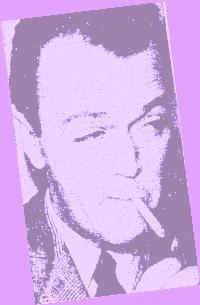 | ||||||||||
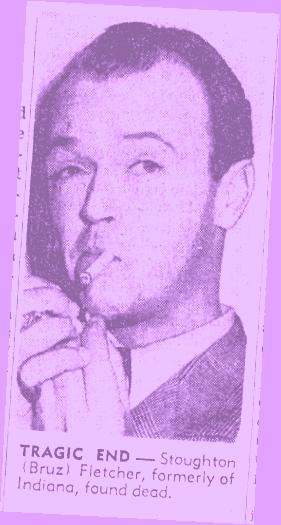 | ||||||||||
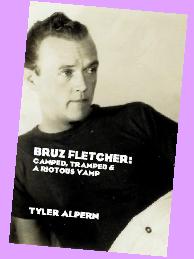 | ||||||||||
Bruz Fletcher: Camped, Tramped & A Riotous Vamp
is almost 200 pages containing the fruits of 9 years of exhaustive research including: heaps of unpublished images, Bruz Fletcher's extended and fascinating biography and family, analysis and commentary of his work from both queer and straight perspectives, lyricsto his songs; contributions from family members, collectors, and fans; bibliography, research details and more. Available Here. Interested past and new contributors to this site can receive a free collectors-only edition of the book with an additional 50+ pages! | ||||||||||
By 1932 Bruz and his partner of many years, the aritst Casey Roberts, were living in Newport, Rhode Island's artists' colony on Washington Street. That year Bruz published both his novels. The parallels to his life and the fiction he created were numerous and obvious. Within the first three paragraphs of his first novel, the heroine’s father declares bankruptcy and everything is sold but not before her mother takes to bed and kills herself. Character Peter Martin eventually reveals many clues about Bruz’s own psyche and experience. Bruz himself seems to be a perfect mix of both Judy and Peter, almost as if he split himself in two in order to create the fiction. The novel included a plate of Casey Roberts’ portrait of Bruz. The second book is again a high society affair, the most memorable character a saucy dowager of the type he would later cast in a few of his best songs and the handsome love interest is an aviator given the deliciously camp moniker Gayland Boye! Just as the first book seems to parallel his own life, the second loosely retells many of the public turmoils of Bruz's older sister : how she ran away to make a life for herself, took an alias, a failed society wedding to a foreign count. His 1930 play The Greater Thing is an over-the-top Oedipal nightmare, in which the leading man is consumed with rage and grief from the childhood loss of his adored mother, a character whose circumstance Bruz saddly understood intimately well. The villian, in typical Fletcher fashion, is dangerously alluring. Fletcher is not the least bit subtle in making that clear in his unnecessarily lustful and slightly too long description of the character: "He is a man around fifty years of age, powerfully built, good looking in a rather evil way, essentially masculine and very sex attractive." Plenty of soda water must have been used to clean those sticky typewriter keys after he wrote that! The taboo love story certainly would have resonated with gay folk back then, a time when they regularly refered to with the term "perverts" in mainstream news media, harrased by police and suffered terrifying legal persecution. Surprisingly, Fletcher's prose and playwriting do not feature the cleverness, humor or complex characterizations that his short narrative songs do. But his bright songs have a strong sense of humor and humanity that has kept them fresh and relevant after 80 years.
Bitchy society gossip provided the inspiration and subject for so many of Bruz’s songs: "She’s My Most Intimate Friend," "Miss Day," "The Hellish Mrs. Haskell" ( "Society Lady"), "Hello Darling," and "Mrs. Lichtenfall." His highly narrative songs mostly reflect the wealthy lifestyle he was born into and the cafe society he became a glittering part of. Although they are amusing fictional tales, they are autobiographical windows into his world. One can't help but speculate if there is not some autobiographical truth in the song "Peter Lillie Daisy." It is the story of a demanding father and non binary gendered child who eventually finds success, happiness and acceptance in Hollywood and writes his father off. His songs are a showcase of his quick comic wit, but include a heavy mix of tragedy. His protagonists often have terrible ends in spite of the light, happy nature of the songs. The “gorgeous” gay butler in “Mrs. Lichtenfall” is shot dead, the madcap society girl turned movie star Miss Day dies young, the Adonis-like traveling salesman Hilly Brown is castrated, and perhaps drawing a bit from his own life: a mother is poisoned. Fletcher’s two love ballads “Reminiscent of You” and “Drunk with Love” leave the singer/composer ultimately alone. “Oh, For a Week in the Country,” "The Prairie" and "The Simple Things of Life” are not at all what their titles suggest but are in fact genuine love songs to the modern urban life of the well to do. A definite homoeroticism flavors his entire songbook. “Oh, For a Week in the Country” and "The Prairie" are rich with gay code and double meanings but "My Doctor" is a transparent and unashamed gay love song. There is an occasional sense of elitism in his lyrics and writing that clearly reflect his privileged upbringing and a definite distrust and indifference to “servants.”
Bruz recorded for the small independent label Liberty Music Shop. His songs have a only a few direct uncoded homosexual references but can be described as sophisticated, energetic, witty, gossipy, campy, bitchy, cosmopolitan, bawdy; in a single word gay. They are full of rhymes, innuendo and amusing puns much in the manner of fellow Hoosier Cole Porter or Noel Coward. The double entendres in "Lei from Hawaii" and "Keep an Eye on His Business" are cheeky and irreverent. Fletcher frequently in jected elements of his own biography into his songs and other writing. His yearings are voiced by the characters he created but can often be clearly attributed to him directly because of the numerous biographic elements and parallels he infuses into his writing. They comingle with and validate the emotional and poetic content. The lonely streets of Manhattan and the dark places he found comfort there, the sophisticated "New York Man" and blue collar ice man he longed for, the exquisite meals prepared by Marcel Lamaze at the cafe Bruz played before the Bali, his mother's death by poison are but a few examples.
Bruz wrote and performed in an era when homosexuality was considered a perversion by the medical community, a sickness to be cured and was legally a crime punishable by imprisonment. He spoke out against that mentality in the only way he could, guised in metaphor and comedy. Perhaps inspired by the pet monkeys he and Casey kept, the lyrics to "Hello Darling" find Bruz using his fondness of monkeys as a metaphor to mock society’s beliefs that homosexuals were sick perverts and criminals: "The new psychiatrist that I am going to in the Bleecker Building says that I’ve got a primate urge, yens to sleep with monkeys, marmosets - anything with a big tail. I’ll have to marry Gargantua before I get through. Don’t you understand - it’s my only escape! Waiter, it’s coming on me again. Send out quickly and get me an ape!" The same comic device was later used in Cabaret in the staging of the song "If You Could See Her Through My Eyes" where an ape was substituted for a Jewish girlfriend. Bruz would have to use metaphor and comedy to express that kind of social criticism. No one was publicly challenging the misunderstood nature and harsh treatment of homosexuality in the thirties. I think it may be his most daring lyric!
In “Peter Lillie Daisy” (also recorded as “It,” ) Bruz is much more direct in confronting the values of a hostile society, and thru song he makes himself a pioneer in his early public affirmation of gender fluidity and promotion of the notion that transgender and transexual people could possibly and happily exist. Fletcher created his own fictional version of gender chameleon Jennie June. Little Peter Lillie Daisy or "It" is a misunderstood young person with the wonderful ability to instantly change from male to female and back again. Seeking its father’s approval and searching for its place in the world it ends up finding its own self acceptance and happiness. To a population of closeted homosexuals forced to move with great agility between the worlds of straight and gay, the metaphor of changing one’s gender at a whim, must have been easily appreciated. Much like the Shakespearean fool, a character who used humor to speak the truth to an otherwise unreceptive monarch and attentive audience, Bruz’s “sophisticated” or risqué comedy had profound meaning delivered in a palatable manner. His use of the pronoun 'it' predates by 80 years our new use of pronouns "they, them and theirs."
"She’s My Most Intimate Friend," and "The Nympho-Dipso-Ego Manic" are songs in which the outcast heroine defies societal norms and morality without regret and thus relate strongly to queer audiences. "She Meant to Go Right (and Went Wrong)" is yet another in this vein: "...when she was hungry for food or for love, she'd take what she found without thinking of convention, diss-ssention or mention in song," but in the end Fletcher vindicates her and admonishes his own well-to-do nightclub patrons, "...one might imagine from what I have said, she'd be ashamed to hold up her head...she's still going strong on the road she thinks right that's so wrong to you lovely people, who mean to go right and go oh! so wrong!" Similiarly, the proudly rouge, raucous and vulgar "Hellish Mrs. Haskell " gets the delightful pleasure of eloquently exposing the hypocrisy of her society peers one by one.
Bruz’s prominent use of code words ‘gay’ and ‘belle’ in “Garden City Belle” would have been noticed by homosexuals of the thirties even though they do not have a functional double meaning here. This proud tale of a sexual outsider would resonate with a gay audience. The fact that the belle is truly of female gender still fits 30s code when gay men often referred to themselves and others as ‘she.’ Stuart Timmons’ article on Bruz explains, “But the girls could easily be boys beneath, especially in an era when gay men often considered each other as 'sisters' and when drag names abounded.” In "Keep an Eye on His Business” Bruz describes first hand how to please a man using a device of turning the enitre chorus of the song into a quote from a female. He does not imitate a woman’s voice in either or when he quotes women in “The Hellish Mrs. Haskell,”“Miss Day,”“Mrs. Licthenfall” or “Hello, Darling!” but the flip side of “Garden City Belle” is “The Human News Reel” in which every character is a female eccentricof sorts. Bruz does use a different and sometimes falsetto voice to personify each. For the character of the overtly lesbian and stereotypically butch masseuse, he actually deepens his voice. In the song, she works on Greta Garbo, whose affairs with women in 20s and 30s are well documented. Bruz may well have been privy to that knowledge, hence the reference.
Fletcher proclaims his sexual desire safely coded and concealed as a first person feminine confession in songs "My Doctor" and "I'm Madly in Love (with the Ice Man)": "I’m afraid something awful’s come into my life. There’s a strange sort of change in the air… And while this will cause gossip, I really don’t care...I don’t know his name or from what town he came, but I know he’s a hero to me. He’s strong and athletic, his muscular biceps are thrilling to see. I long to be kissed but to him don’t exist. I can’t think how it ever began. He’s not proper I guess ..." Heartbreak continues as Fletcher describes the all too familiar victim of sexaul harrassment in "Casting Room Rose". His lyrics sympathize,"..sometimes you long to be back there once more, back in that old fashioned little town, but you’ve made up your mind that fame you will find....Casting Room Rose your petals may tremble, Casting Room Rose, you’re feeling blue. Musn’t look shabby, musn’t look drab, must keep smiling though your heart may be sad and nearly breaking. Sweet little Rose there’s a tear in your eye dear…"
Bruz Fletcher’s long run at Club Bali ended the week of January 10, 1940. Although he once again topped the bill there, appearing with the great Nellie Lutcher from May thru mid June and mid July to mid September, he only worked 19 weeks that year. In his final week at the Bali, Hedda Hopper (perhaps in an effort to help save his job) wrote in her column "don't miss Bruz Fletcher at the Bali." From that same month there exists a strange telegram exchanged between Jack Sowden and James Broughton expressing concern for Bruz. Sometime in 1940, Fletcher cut his last few records for Liberty Music Shop. Bruz mysteriously disappeared for a while at the end of 1940, spent the holidays with family and returned to Hollywood in late January 1941 and was dismayed upon his return to find the Bali closed.
Due to frequent police crackdowns on gay performers and clubs, Bruz and many other performers could not find employment. He thus grew increasingly despondent and appaerntly committed suicide on Feb. 8, 1941, in Tarzana, California at the age of thirty-four. He had just spent the Christmas holidays in Saranac, New York, with his extended family and seemed fine then. His death came as a total shock to them. The strange circumstances of his death and the characters and places involved are typical of the high drama and mystery that shrouds his short complex life.
Bruz’s body was cremated in Canoga Park under the directions of his father who was living in Tarzana working as an elevator operator and there was no memorial service. He is not buried with the other Fletchers. After about a year and with some help from one of Bruz's aunts, Bruz's ashes were given to Casey. Bruz had been disillusioned and unhappy in Los Angeles and had no ties to Indiana so where to place Bruz was a bit of a quadry. Bruz loved monkeys. Before he kept them as pets and when Casey and Bruz romance first began, they would often visit the monkey house at the LA Zoo. Those were the days when Bruz was most happy. In a scene that must have been Felliniesque, Casey and a mob of friends brought Bruz's ashes to the San Diego Zoo and left him with the monkeys.
Bruz's Aunt Louisa once wrote:
I wish that there were some wonderful place Called the Land of Beginning Again, Where all our mistakes, and all our heartaches, And all of our poor selfish griefs Could be dropped like a shabby old coat at the door, And never be put on again.
But there is not such a place, or at least there was not for Bruz.
Bruz’s own words express much the same sentiments as penned by his aunt. Describing his character failed songwriter Peter Martin, Bruz wrote: “He wished he had a head master and was back in school. That someone could correct him and give him five black marks and allow him to start again. That was the horrible part about growing up. There wasn’t anyone to do that. There wasn’t anyone to apologize to or blame. It was always your own damn fault.”
Incidentally, Bruz's first novel did not live up to its jovial title. Instead, it begins with the cryptic dedication to his wealthy cousin, “to Agnes, who makes life much less a hell than it was originally intended.”
In 1946, the wild Frances Faye made a daring choice to include Bruz’s “Drunk with Love” on her first album! She kept Bruz’s artistry alive by recording the song on 3 of her albums over her career and by performing in it concerts for decades until she retired. By doing so in those closeted days, she outted herself to the gay folks in the audience who would know the record and its source. Yet she never mentioned its composer and let the beauty of the song be unspoiled by its sad history. Marijane Meaker's book, "Highsmith: A Romance of the 1950's," mentions that Faye’s rendition of the song was frequently played in lesbian bars of the era. Its popularity during the 40s and 50s is documented in many LGBTQ histories. Balladeer Miss Jimmie Reynard (a legendary male impersonator or drag king pioneer aka Miss Jimmy Reynard) recorded a faithful, heart felt and same sex lyric version of the tune. Dressed in a man's suit, wearing red lipstick and shorter hair, she must have performed the song countless times at lesbian bars Mona's 440 and Mona's Candle Light in San Francisco and at Tess's Cafe Internationale in Los Angeles where she may have encountered Fletcher or Faye just a block away at the Bali. The song really became an anthem and never seems to have lost popularity in San Francisco.
Later, Pearl Bailey recorded the song with alternate, 'radio safe' lyrics that entirely changed the meaning, Chanteuse Joyce Byant, whose hair glistened shiny silver from heavy and toxic radiator paint, gained noteriety with her a crazy interpretation of the original version which was publicily banned from the radio. Her record's label oddly also gave Bryant and Stuart writing credit for Bruz's tune! The 1950 posthumously published sheet music of the song features Bryant on the cover but justly returns tune smithing credit to Bruz. The orginal Faye and Reynard recordings leave the song unattributed. Later Faye recordings attribute the song alternately to Fletcher friend Queenie Smith who introduced the song around 1933, Bryant (& Williams) and sometimes to Fletcher himself.
San Francisco saloon singer and "inventor of the piano bar" Wilbur Stump released an album that included the uncredited "Drunk with Love" on the occasion of his 75th birthday and to commemorate 63 years in show business in 1978. Closer to Fletcher's original version than to Faye's, the plaintiff lyrics must have struck a chord in the seven-times divorced, alcoholic nightclub performer. He can be heard singing the song in the 1985 film "My Mother Married Wilbur Stump." Peter Allen biographer Stephen MacLean wrote that urged by his assistant Bruce, “Peter had obsessively tried to find sheet music on “Drunk with Love,” but almost like Frances herself, could find no trace it ever existed except from her recording.” It seems that Bruz, like the character Peter Martin from his first novel, gave up trying to get publishers to buy his songs. Bruz only copyrighted a handful of his songs, including,“Drunk with Love.” In 2004, a singer won “Entertainer of the Year” at a San Francisco Cabaret Competition singing Bruz’s “Drunk with Love.” She writes, “Since I was unable to locate the sheet music, I carefully transcribed the chords and lyrics to “Drunk With Love” and, during a showcase event held by the competition organizers, proceeded to regale the crowd of over two hundred with my best interpretation of Frances Faye, complete with the “ex-husband” introduction of my now amazingly talented and fabulous accompanist, Barry Lloyd. The room went wild. A gentleman in the audience contacted the producer the next day asking him to find out where I found a copy of the sheet music for “Drunk With Love!” In 2012, 2 copies of an unknown and distinctly different recording of Bruz performing "Drunk with Love" were discovered. Also of note, Drunk with Love Records founder Jake Bellissimo named their company in honor of Bruz Fletcher.
In 2016, 2 new theatrical works showcased the song. Drunk with Love: A Tribute to Joyce Bryant by Tiffany Prewitt and starring Miracle Sims was staged in Atlanta. Taming the Lion by Jack Rushen re-imagined the life of William Haines and his friendship with Joan Crawford in 1933 and refers to Fletcher and the Bali directly. "Drunk with Love” was woven throughout the production and the complete lyrics are featured in the script. Who cares much that it takes place a few years before Fletcher came to California and the bamboo clad Bali even opened? So great that it was included.2019 found Berlin based Bad Mouse Orchestra discovering and performing"Drunk with Love" to new audiences. . A band member writes, " I heard "Drunk with Love" for the first time just a few weeks ago and it just won't let me go ever since. I can honestly say that hardly any other song has ever moved me so much before and it's hard to explain why." Another revealed, "We performed his song "Drunk With Love" for the first time two weeks ago in Dublin, Ireland at a ukulele festival. Charlotte announced the song as a preview on our queer project and two girls (maybe lesbian or trans) in the first row started to cry during the song. That means that we surely are on the right path and that the time is right for a revival of the queer heroes of the swing music era." The band released CD of queer music titled "Drunk with Love” in 2020. It includes three Fletcher tunes and a Miss Jimmie Reynard song.
The change of format from 78 rpm to LPs in the early 50’s doomed Bruz’s recordings into a premature deep obscurity. But some of his other songs have lived on. “She’s My Most Intimate Friend” was all but plagiarized for the great Bea Arthur number “Couldn’t Be Happier” in Ben Bagley’s Shoestring Revue. Carroll Davis' performance of "She's My Most Intimate Friend" can be seen in the 1985 documentary "Before Stonewall." Around 1950, Reta Ray, The Naughty Nightingale, recorded “Keep an Eye on Your Husband’s Business” which borrowed heavily from Bruz. In 1977, some of Fletcher's songs along with tunes penned by Cole Porter and Hoagy Carmichael were performed by mezzo soprano Elizabeth Mannion at a rectial which paid tribute to Hoosier composers. Dr. Demento has on four occasions included “My Doctor” on his show. Drunk with Love is the title of the 2005 tribute show to Frances Faye and 2007 CD. Bruz's contribution to gay life in the 1930's and my website is documented in the late Stuart Timmons' 2006 article in The Gay and Lesbian Review and mentioned briefly in his book book Gay LA. In a 2009 interview published by Lavendermagazine.com, Doug Wright revealed that the gay character of Gould in the musical Grey Gardens was partially inspired by Bruz Fletcher, "... we sort of drew alot of inspiration from a cabaret piano player from the 1940s named Bruz Fletcher. He made a few recordings that are still available to us. He was wildly camp and ended up committing suicide. And very droll, but clearly a product of that early generation of gay man in this country for whom it was disapproved of socially and (who were) still living a coded underground life so it engendered alot of internalized homophobia and I think Gould suffered from all of that. So he’s kind of a tragic broken figure I think. " In 2010, all but 6 of Fletcher's known recordings were released on CD and digital audio platforms. By reissuing his music and sharing this research, he is no longer overlooked and unrepresented in gay historical surveys and literature. In just a few short years Fletcher's legacy and artistry have risen from obscurity to becoming as important as those of the better remembered, prolific and fascinating legend Rae Bourbon.
In 2015, pioneering playwright Robert Patrick performed "The Simple Life for Me" in front of the building located now where the Culb Bali once stood on the Stuart Timmon's City of West Hollywood LGBTQ History Mobile Tour. Footage of his performance was later included in a series of hastily made 2021 videos for Weho Pride in which 3 differernt narrators all mispronounced Bruz's name and got some facts wrong. On Bruz's 111th birthday in 2017 Drunk with Love Records released an album of Fletcher's songs reimagined for a new generation with fantastic and innovative interpretations. Also that spring, drag star Elsa Touche lip synced to Frances Faye's Capitol version of "Drunk with Love" at The Stud in San Francisco. In late 2017, stunning filmed footage of Fletcher with good friends Patsy Kelly and Monte Wooley and others at the Bali was preserved and digitally archived. Music and lyrics to 5 more songs never recorded also were recently discovered. In 2018, a copy of one of Fletcher's 4 known lost plays was secured, wonderful rare photos of Casey Roberts and his family were shared by a great-niece of his. In March, Marlene Bellisimo presented their thesis paper Hidden in Plain Sight: Queer Songwriters and the Pansy Craze at the Eastman School of Music that included Bruz Fletcher and a brief private recording of Frances Faye. No less than three writers and performers have let me know about other exciting Fletcher projects in the works during 2018. Research continues and an updated edition of the book is sorely needed. Jenny Hamel's KCRW NPR story featuring Fletcher is here: http://curious.kcrw.com/2018/05/the-pansy-craze-when-gay-nightlife-in-los-angeles-really-kicked-off ' In 2021, two lost artworks of Casey Roberts resurfaced and a covid era zoom reading of Fletcher's never produced play "The Greater Thing" brought new life to a long forgotten early effort. New research into Fletcher, Roberts and their circle reveals more colorful details about their complex life and era. On Jan 31, 2024 my interview about with Kyle Long on NPR's Cultrual Manifesto went on the air. Kyle did a wonderful job, but in my nervousness I made a few big blunders and little mistakes (mixing up Palm Beach and Palm Springs and describing the location of the Sunset Srip outside the LA city limits but in LA county - to name a few. But the essence of what I was trying to say still comes through.) Very good into to Bruz, his story and creative work. Thank you, Kyle. https://www.npr.org/podcasts/505439234/cultural-manifesto. Dan Crall on KORC Community Radio in Corvallis has had Fletcher's music on rotation for the station and created a special tribute to him on his Feb 7 &10, 2024 MixtapeShow. Fletcher became a character in the 2022 romance novel Idle Gossip by Renee Patrick and recent books that include Fletcher are: 2021's Twilight Man, 2023's Historical Dictionary of Vaudeville &Strictly Dyanmite: The Sensatioonal Life of Lupe Velez, and 2024's Greasepaint Puritan. 2024 found nearly all Fletcher recordings from a private collector shared on Youtube. Missing are 5 alternate recordings with alternate lyircs and interpretations. But all his recordings save one have been remastered, sound better than ever and can be found here.
Copyright Tyler Alpern 2004 - 2024 The website's content is copyrighted. No material from the site may be republished, copied, posted, rewritten, printed, photocopied, broadcast, publicly displayed, or distributed in any way without prior written permission except that you may view many of the site's pages with a web browser and you may print a single copy of those pages for your personal, noncommercial, home use. Markers in text, so ask permission before using. | ||
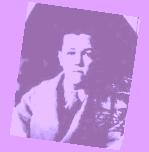 | ||||||||||||||
 | ||||||||||||||
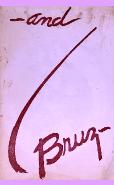 | ||||||||||||||
 | ||||||||||||||
 | ||||||||||||||
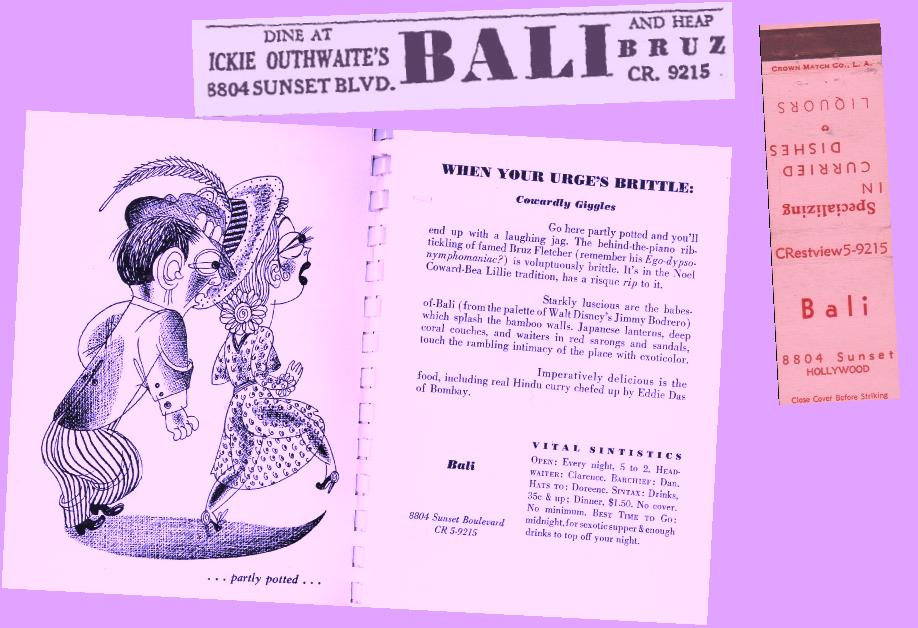 | ||||||||||||||
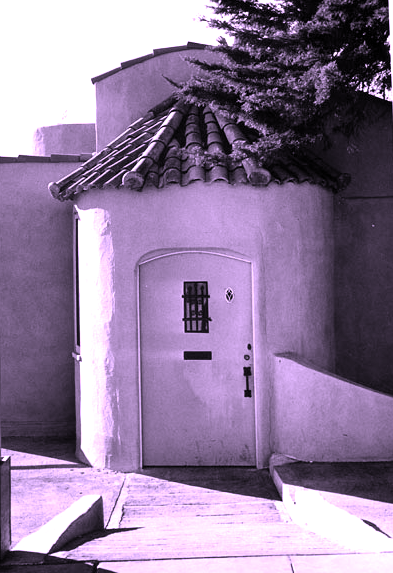 | ||||||
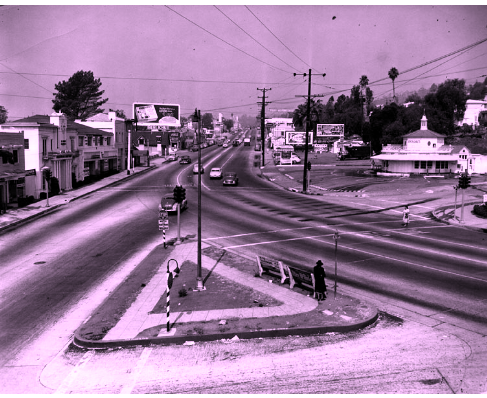 | ||||||
Left: Front door to the Bali Building, later replaced by notorious gangster Mickey Cohen then replaced again in the 80s by the bland brick Carolco Pictures building (remember Lyle and Erik Menendez?) Now it's IAC and home of the eatery Estrella. Above. Bali's location on The Strip in 1939. The Bali is off camera just to the left of the photo. Across the street the drive in restaurant later became the location of the original Tower Records Casey Roberts' final residence is just a few blocks away on Larabee Street. The morturary with the columns on the left side of the image handled his remains. Below: The Bali and 8804 Sunset Blvd over the years and Bali neon in a multiple exposure image from 1936. | ||||||
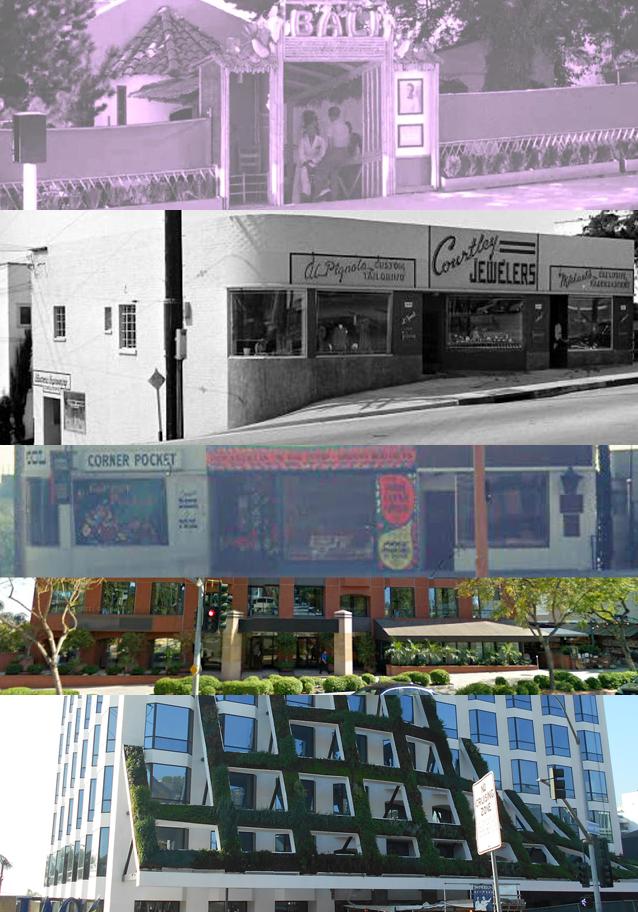 | ||
2025 remastered release above and the orginal Liberty Music Shop 78rpm album of records below. | ||
 | ||
 | ||
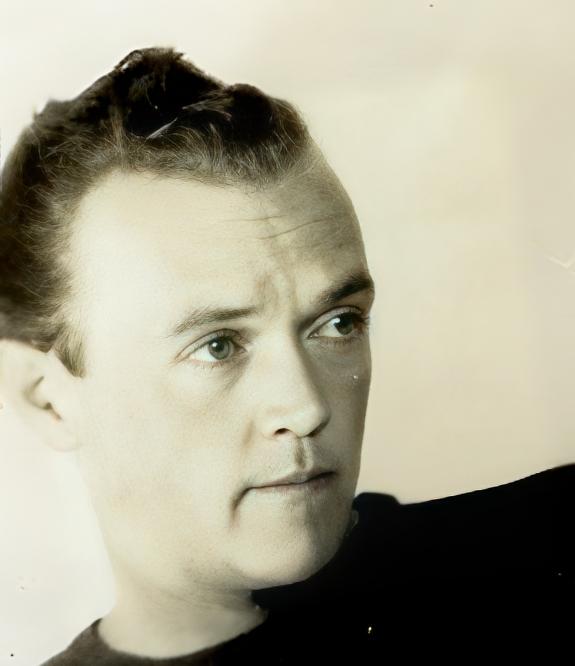 | ||||
| ||||
